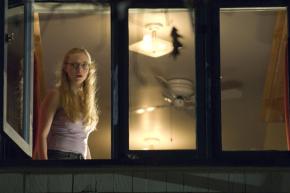More than just a body
looks at what the horror movie Jennifer's Body has to say about sexism.
TAKEN AT face value, Diablo Cody's latest film, Jennifer's Body, could be seen as a monstrosity to feminists, but it's more nuanced and complex in its analysis of sexism.
Coming after decades without a tangible, fighting women's rights movement, the film is a tragic reflection of what a lack of struggle against oppression can do to people. The opening line declares, "Hell is a teenage girl," and if you've been a teenage girl in the recent past, you would probably concur.
The actor playing Jennifer, Megan Fox, has perhaps the most unrealistic unattainable body in Hollywood right now. Almost all her roles, such as in the movie Transformers, have required her to be vapid and have a "hot" body. As Jennifer, she illustrates the travesties that result from being looked at as a body and nothing else for one's entire life.
At the beginning of the film, Jennifer shows how she has internalized a fiercely sexist society when she grabs her best friend's breasts and says, "These are power bombs. Point them in any direction, and things will get real." This is a hyper-sexualized response to rampant objectification, in a world where no one is saying that we can do anything to stop the objectification itself.

When the overtly sexual Jennifer tries to seduce a cool band member at the only club in the podunk town of Devil's Canyon, she gets horrifically taken advantage of by the entire band. They sacrifice her to the devil in order to acquire fame and fortune. It isn't blatant, but sexual violence is implied.
This act turns Jennifer into a succubus--a demon from medieval legend that inhabits a woman's body and seduces men in order to draw energy to sustain itself.
For anyone who knows someone who has been a victim of sexual violence, or who has been herself, the whiplash in reaction to it can produce heart-wrenching results--from self-destructive behavior, to anger problems, to hyper-distorted sexuality. Jennifer begins to prey on under-confident, awkward boys--not on outright sexist ones. There are also a couple references to her being bulimic.
Her best friend Needy knows something terrible has happened to Jennifer and tries to be supportive of her despite Jennifer's increasing hostility. Needy's desire to figure out what has happened to her friend leads her to the occult section of the library (Warning: there are some spoilers in the next few paragraphs). She finds out that the only way to exorcise the demon is to take a dagger to the heart of the body it lies in, symbolizing the way friendships must sometimes be severed when destructive elements take over.
Then, we're brought back to where the film begins--Needy in the penitentiary on charges of murder. We find out that a bite from her final fight with Jennifer has given her some of the demon's powers. She too has been burned by the effects of sexism. So she supernaturally breaks out of prison to take glorified bloody revenge on the band that destroyed her friend.
THE MOST gaping, but expected, flaw of the film is that the solution to sexual violence is to go after the individuals who committed it, instead of a system that produces it. It's completely acceptable for someone to want to seek revenge on the person that so inhumanely violated her or her friend. But doing this alone will not stop sexism.
What this film does exceptionally well is show the nuances of how distorted female friendships can become as a result of a sexist society. I'm sure most women will find parts within both Jennifer and Needy that can be directly comparable to parts of their own life.
This is the sophomore film of screenwriter Diablo Cody--who won an Oscar for her film Juno--and indeed, it is far more sophisticated than her previous works. Cody is becoming the pop-culture face of feminism, shining her pearly whites on the cover of both Bitch and Bust magazines. The fact that these are the titles of our two mainstream feminist magazines is another sad reflection of where the fight for women's rights is. But that's an entire article unto itself.
The media has focused narrow-mindedly on one small part of this film--the "gratuitous" kissing scene between Jennifer and Needy. To this, Cody says, "If the two protagonists of the film were a guy and a girl, and in a particularly tense moment, they shared a kiss, no one would say it was gratuitous." She is absolutely right. The sensationalizing of this kiss only contributes to the bro culture, and double standard of lesbians and female bisexuals in today's world.
This film might be a little too campy for most people's sensibilities. But it's well worth the watch for what it shows us about the unnecessary agony in the world we live in.


